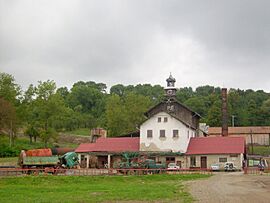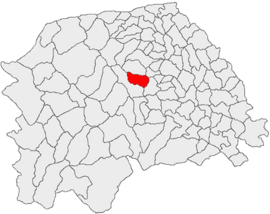Cacica facts for kids
Quick facts for kids
Cacica
Kaczyka
|
||
|---|---|---|

The salt mine in Cacica (September 2007)
|
||
|
||

Location in Suceava County
|
||
| Country | ||
| County | Suceava | |
| Area | 57 km2 (22 sq mi) | |
| Elevation | 385 m (1,263 ft) | |
| Population
(2011)
|
Lua error in Module:Wd at line 1,575: attempt to index field 'wikibase' (a nil value). | |
| Time zone | EET/EEST (UTC+2/+3) | |
Cacica (Polish: Kaczyka, German: Kaczika) is a commune in Suceava County, in the historical region of Bukovina, northeastern Romania. The commune is located in the central part of the county, 17 km (11 mi) from the town of Gura Humorului, 34 km (21 mi) from the city of Rădăuți, and 28 km (17 mi) from the county seat, Suceava. At the 2011 census, 74.8% of inhabitants were Romanians, 20.2% Poles, and 4.4% Ukrainians. Its Polish inhabitants are descended from settlers who arrived there at the turn of the 19th century during the Habsburg period.
Contents
Villages
The commune is composed of five villages: namely Cacica, Maidan, Pârteștii de Sus (the commune center), Runcu, and Solonețu Nou.
Solonețu Nou
Solonețu Nou (Polish: Nowy Sołoniec) is one of the Polish villages in Suceava County, in the historical region of Bukovina, northeastern Romania. It was established in 1834 by 30 Polish families in the Soloneț river valley.
A Polish school was founded in the village in 1870. 523 people from the village were deported to Poland after 1945 and the school was closed. Some Poles settled in Złotnik, Poland. After the Romanian Revolution of 1989, the Polish school was reopened. In 1995 there were 718 inhabitants in the village. The Polish community from Solonețu Nou (together with those of Solca, Pleșa, Racova, and Arbore) has 365 families with 1046 Roman Catholics of Polish ethnicity.
Natives
- Valeriu Alaci (1884–1955), Romanian mathematician
- Ghervazen Longher (born 1972), Polish-Romanian politician
Gallery
-
Roman Catholic chapel dedicated to Saint Barbara, located in the salt mine
-
Orthodox church in Cacica
-
Solonețu Nou (Polish: Nowy Sołoniec) village, with the local Roman Catholic church seen in the background
See also
 In Spanish: Cacica (Suceava) para niños
In Spanish: Cacica (Suceava) para niños
















